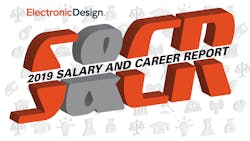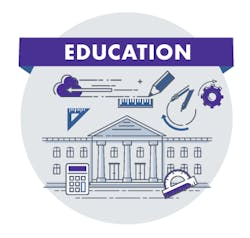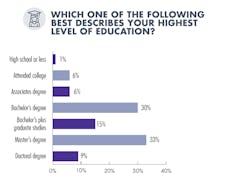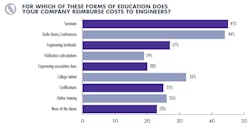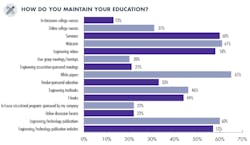Learning is a life-long endeavor. The day we stop learning is the day we lose something of our humanity. In an ever-changing, technology-driven world, one would be hard-pressed to name a vocation for which an inquiring mind is more necessary than engineering. In our 2019 Salary & Career Report findings, one of the topics we asked you about was continuing engineering education. What level of education do you have today? How do you approach learning new things? Does your employer encourage continuing education by footing the bill? In this article, we’ll look at these topics with facts, figures, and anecdotal responses.
The main question for this section of the survey asked: “What are some of the ways in which you continue your engineering education?” As was the case in 2018, white papers lead the plethora of information sources—65% of respondents seek them out to brush up on new trends and technologies. Many of the vendors in the electronics industry do a great job of creating and promoting their white papers and, for the most part, they’re freely accessible to one and all.
Webcasts are the second-leading source—61% of respondents say they devote at least some time to viewing them. It’s worthwhile to remember that webcasts don’t have to be consumed as live events. They’re typically available on demand after the fact. Engineering/technology publications, seminars, and engineering videos have a lot of fans out there, too, consumed by 60%, 60%, and 58% of respondents, respectively. Other popular sources of continuing education include engineering/technology publication websites, textbooks, e-books, and vendor-sponsored education. It’s clear a wide variety of information sources is out there, and that engineers take advantage of them all to one degree or another.
We asked about respondents’ highest levels of education, and the leading response was a master’s degree (33%), followed by a bachelor’s degree (30%), a bachelor’s degree plus some graduate study (15%), and a doctorate (9%), with lesser degrees/non-degrees following behind.
Employers Paying the Freight
Making the decision to stay current gets a little easier when you know that someone else is picking up the tab. We asked, “For which of these forms of education does your company reimburse costs to engineers?” Not surprisingly, because it’s sometimes a costly proposition, seminars lead the field at 45% of respondents. It’s for good reason, too—it’s not hard to find seminars on cutting-edge technical topics led by industry experts and thought leaders.
In terms of industry trade shows and conferences—also outstanding sources of up-to-date information on emerging technologies and trends—45% of respondents report that their employers will cover the costs for them to attend. Some 32% report that their employers will ante up for college tuition fees. Another 27% rely on engineering textbooks, while 26% resort to online training courses.
Finally, we asked, “What are the biggest challenges you face trying to stay current with engineering information relevant to your work?” The anecdotal responses indicate that, by far, the most prevalent impediment is time, or rather the lack thereof. “I get swamped with projects and don’t have the time to stay current with engineering information,” one engineer lamented. Another respondent adds, “In all honesty, the biggest challenge in staying current is that my employer works us to death with 70+ hour work weeks. In addition, they don't support engineers taking courses (online or at a college) and don't really give us the ability to travel for engineering conferences or seminars.” This response seems to represent the other side of the coin vis-à-vis employers actively supporting continuing education.
Another key challenge to staying up to date is, as one survey respondent put it, “the drinking-from-a-firehose issue; there is just too much information and new technology to absorb.” Some lamented of this issue with respect to specific areas of work, such as the automotive market. “A major issue is the pace at which automotive engineering is changing to adopt new technologies, such as automated driver-assistance systems (ADAS), electric vehicles, and so on.”
Please feel free to contact us with any comments once you’ve looked at the data. And stay tuned for more installments in this series of articles dedicated to our 2019 Annual Salary and Career Report.
